NOOTROPICS : COGNITIVE ENHANCERS FOR PEAK PERFORMANCE
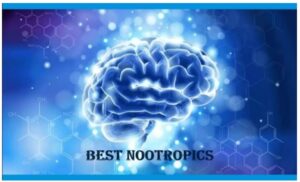
Introduction:
In today’s fast-paced world, people are always looking for ways to improve their cognitive performance. Nootropics, also known as cognitive enhancers, are substances that can enhance cognitive function, such as memory, attention, and creativity. They can help individuals achieve peak performance, especially in high-stress situations, such as exams, work presentations, or sports competitions. I dabbled a bit with some nootropics like caffeine, nicotine, phenibut, Alpha brain etc to enhance my cognition, focus and productivity. I shall here share my experience before I explore the concept of nootropics, their types, benefits and risks, ethical and safety considerations, and examples of compounds, methods, and celebrities who have hacked their performance.
As far as my story is concerned, I was raised as a child in a household where consuming tea or coffee was considered a bad habit, and I was discouraged from indulging in them. However, as I entered college, I became curious about the energy-boosting effects that many of my peers claimed to experience from caffeine. So, I decided to give tea and coffee a try, and I was amazed by the enhanced productivity and focus they provided me.

Gradually, I developed a habit of consuming coffee and tea to kickstart my day and keep me alert during long study sessions. However, over time, I noticed that my tolerance to caffeine increased, and the same amount of coffee or tea no longer had the same impact on my cognitive performance. I knew I needed to find an alternative that could help me maintain my productivity levels without developing a tolerance.
That’s when I stumbled upon the world of nootropics – cognitive-enhancing supplements that could potentially provide me with the mental edge I was seeking. I started experimenting with different options and found that a combination of coffee and Theanine in a 1:2 ratio worked wonders for me.
Theanine, an amino acid naturally found in tea, helped to counteract the jittery effects of caffeine, promoting a state of calm and relaxation without causing drowsiness. This perfect synergy of coffee and Theanine provided me with a smooth, focused, and sustained cognitive boost, allowing me to excel in my studies and other cognitive tasks.
Not only did this nootropic stack improve my focus and cognition, but it also enhanced my productivity, enabling me to accomplish more in less time. I was able to breeze through my assignments, exams, and other academic tasks with clarity of thought and heightened mental acuity.
In addition to my coffee and Theanine combo, I also occasionally incorporated Alpha Brain into my nootropic regimen. Alpha Brain is a well-formulated nootropic supplement that contains a blend of ingredients like tyrosine, Theanine, and huperzine, which are known for their cognitive-enhancing properties. I found Alpha Brain to be effective in combating anxiety, boosting my mood, and further enhancing my productivity during times of increased stress or high-pressure situations.
I did experiment with other nootropics as well, such as Phenyl Ethylamine (PEA), which is known for its mood-enhancing effects. However, I found that the effects of PEA were short-lived and not sustainable, as it caused spikes in blood pressure and heart rate, which I deemed to be harmful in the long run.
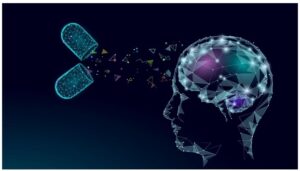
Through careful experimentation and observation, I have developed a strategic approach to using nootropics to enhance my cognition, focus, and productivity. My nootropic stack consisting of coffee and Theanine, along with occasional use of Alpha Brain, has become an invaluable tool in my quest for optimal mental performance. With this regimen, I am able to tackle my academic, professional, and personal tasks with heightened cognitive abilities, allowing me to achieve my goals and excel in various areas of my life.
My journey with nootropics has been an exciting one from initially exploring tea and coffee for their energy-boosting effects, to discovering the benefits of Theanine, Alpha Brain, and other cognitive- enhancing supplements, I have strategically incorporated these nootropics into my routine to optimize my cognitive performance, focus, and productivity. Nootropics have become an invaluable ally in my pursuit of peak mental performance, helping me unlock my full potential and achieve success in various aspects of my life. We will now tale a look at various types of Nootropics.
Types of Nootropics:
There are various types of nootropics, each with its unique mechanism of action and potential benefits and risks. Some of the most common types include:
Stimulants: These include caffeine, amphetamines, and modafinil, which can enhance wakefulness, alertness, and concentration. They work by increasing the levels of dopamine and norepinephrine in the brain, which are neurotransmitters that regulate mood, motivation, and attention.
Herbal remedies: These include ginkgo biloba, bacopa monnieri, and ashwagandha, which are natural extracts that can improve cognitive function, reduce stress, and boost memory. They work by increasing blood flow to the brain, reducing inflammation, and regulating stress hormones.
Synthetic compounds: These include racetams, choline, and phosphatidylserine, which are synthetic molecules that can enhance memory, learning, and focus. They work by modulating neurotransmitter activity, increasing brain cell communication, and reducing oxidative stress.
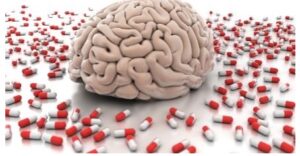
Benefits and Risks of Nootropics:
The potential benefits of nootropics are numerous, including enhanced memory, learning, focus, creativity, and motivation. They can also reduce stress, anxiety, and depression, improve mood and sleep quality, and protect the brain from age-related decline and neurodegenerative diseases. However, they also carry potential risks, such as addiction, tolerance, side effects, and long-term harm to the brain and body. Some nootropics can also interact with other medications, supplements, or health conditions, leading to adverse effects.
Ethical and Safety Considerations:
The use of nootropics raises ethical and safety considerations, such as fairness, cheating, and harm to oneself and others. Some people may argue that using nootropics to enhance cognitive performance is cheating or unfair to those who do not use them. Others may argue that using nootropics is a personal choice that does not harm anyone else and can help individuals achieve their goals. However, it is important to consider the potential harm to oneself and others when using nootropics, such as addiction, tolerance, side effects, and long-term harm to the brain and body.
Nootropics and Biohacking:
Nootropics work through different mechanisms of action, which may include improving blood flow to the brain, enhancing neurotransmitter function, reducing inflammation, and protecting against oxidative stress. Some of the most commonly used nootropics include:
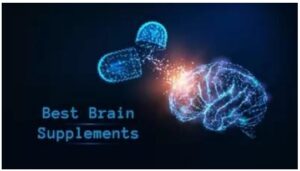
Caffeine: Caffeine is one of the most well-known and widely used stimulants that can improve cognitive function, including alertness, focus, and attention. It works by blocking the action of adenosine, a neurotransmitter that promotes sleep and relaxation, and thereby increases the release of dopamine and norepinephrine, neurotransmitters associated with wakefulness and arousal. Caffeine is found in coffee, tea, energy drinks, and certain supplements, and its effects can vary depending on individual tolerance and sensitivity.
Modafinil: Modafinil is a prescription medication that is FDA-approved for the treatment of narcolepsy, a sleep disorder characterized by excessive daytime sleepiness. It is also commonly used off- label as a nootropic due to its ability to enhance wakefulness, alertness, and cognitive function. Modafinil is believed to work by increasing the release of dopamine in the brain, which can improve motivation, concentration, and cognitive performance.
Piracetam: Piracetam is one of the original nootropics discovered by Dr. Giurgea and is a member of the racetam family of compounds. It is believed to work by improving blood flow to the brain, enhancing the function of neurotransmitters, and protecting against oxidative stress. Piracetam is commonly used to improve memory, concentration, and learning, although its exact mechanisms of action are still not fully understood.
Omega-3 fatty acids: Omega-3 fatty acids, found in fatty fish, flaxseed, and chia seeds, are essential fats that are important for brain health. They are known to have anti-inflammatory properties, improve blood flow to the brain, and support the structure and function of cell membranes. Omega-3 fatty acids are believed to play a role in cognitive function, including memory, mood, and attention.
Bacopa Monnieri: Bacopa monnieri, also known as Brahmi, is an herbal supplement commonly used in Ayurvedic medicine for its purported cognitive-enhancing properties. It is believed to work by enhancing the function of neurotransmitters, reducing inflammation, and protecting against oxidative stress. Bacopa monnieri has been studied for its potential benefits in improving memory, attention, and cognitive performance, particularly in older adults.
Rhodiola Rosea: Rhodiola rosea is an adaptogenic herb that has been used for centuries in traditional medicine for its ability to improve physical and mental performance under stress. It is believed to work by reducing fatigue, improving blood flow to the brain, and enhancing neurotransmitter function. Rhodiola rosea has been studied for its potential benefits in improving cognitive function, mood, and mental performance, particularly during periods of stress or fatigue.
Ginseng: Ginseng is an herbal supplement that has been used in traditional Chinese medicine for its purported cognitive-enhancing properties. It is believed to work by improving blood flow to the brain, enhancing neurotransmitter function, and reducing inflammation. Ginseng has been studied for its potential benefits in improving cognitive function, mood, and mental performance, although more research is needed to fully understand its mechanisms of action.
L-theanine: L-theanine is an amino acid found in green tea that is believed to have calming and relaxing effects on the brain. It is believed to work by increasing alpha brainwave activity, which is associated with a relaxed but alert mental state. L-theanine has been studied for its potential benefits in improving focus, attention, and cognitive performance, particularly when combined with caffeine in a synergistic manner.
Creatine: Creatine is a naturally occurring compound found in small amounts in certain foods, such as meat and fish, and is also available in supplement form. It is well known for its benefits in improving physical performance and muscle strength, but emerging research suggests that it may also have cognitive-enhancing properties. Creatine is believed to work by enhancing the production of ATP, which is the primary source of energy for cells, including brain cells. It has been studied for its potential benefits in improving cognitive function, memory, and mental performance, particularly in tasks requiring short-term memory and quick thinking.
Phenylpiracetam: Phenylpiracetam is a synthetic racetam compound that is believed to have cognitive-enhancing properties. It is believed to work by improving blood flow to the brain, enhancing neurotransmitter function, and reducing inflammation. Phenylpiracetam has been studied for its potential benefits in improving cognitive function, memory, and mental performance, particularly in tasks requiring focus, attention, and motivation.
Nicotine: Nicotine is a stimulant that can enhance focus, attention, and memory. It can also increase dopamine release in the brain, which can enhance motivation and pleasure. Some studies suggest that nicotine can also enhance creativity by improving divergent thinking and idea generation. However, nicotine is highly addictive and can have negative health effects, so it should be used with caution and under medical supervision.
Phenibut: Phenibut is a nootropic that can reduce anxiety and enhance mood and sociability. It can also improve cognitive function, memory, and creativity by reducing stress and promoting relaxation. However, phenibut can also be addictive and cause withdrawal symptoms, so it should be used sparingly and under medical supervision.
Lucid dreaming nootropics: Some nootropics, such as galantamine and choline, can enhance lucid dreaming by promoting acetylcholine production in the brain. Lucid dreaming can enhance creativity by allowing people to explore their subconscious and generate new ideas and perspectives.
Anxiety-reducing nootropics: Some nootropics, such as ashwagandha and Rhodiola rosea, can reduce anxiety and stress, which can enhance cognitive function, creativity, and productivity. By reducing the negative effects of stress on the brain, these nootropics can promote relaxation, focus, and mental clarity.
While nootropics offer promising potential benefits for cognitive enhancement, it’s important to note that the field is still relatively young, and more research is needed to fully understand their mechanisms of action, efficacy, and long-term safety. Additionally, the effects of nootropics can vary greatly among individuals, and some may experience side effects
NOOTROPICS AND BIOHACKING
There are numerous examples of celebrities/biohackers who have used nootropics to enhance their cognitive performance. One such biohacker is Dave Asprey, the founder of Bulletproof Coffee, who has used modafinil to boost his energy and focus during long workdays. Asprey also developed the Bulletproof Diet, which involves consuming healthy fats, such as butter and coconut oil, to enhance cognitive function and reduce inflammation. Many other celebrities, including Joe Rogan, Tim Ferriss, Elon Musk, and Gwyneth Paltrow, have openly shared their experiences with using nootropics to achieve peak cognitive performance. Rogan, a comedian and podcast host, has spoken about his use of Alpha Brain and its benefits in improving focus and mental clarity. Ferriss, an author and podcast host, has written about his experiences with modafinil and other cognitive enhancers. He has also used transcranial direct current stimulation (tDCS), a non-invasive brain stimulation technique, to improve his learning and memory. Musk, a billionaire entrepreneur, has openly discussed his use of nootropics like Adderall and caffeine to enhance his cognitive function and work longer hours. Paltrow, an actress and entrepreneur, has shared her use of racetams to improve memory and cognitive function. It’s worth noting that everyone’s body and brain chemistry is different, and what works for these celebrities may not work for everyone. It’s important to approach biohacking, including the use of nootropics, with caution and informed consent.

The popular movie “Limitless” (2011), features a rotagonist achieving superhuman performance through the use of a nootropic. Starring Bradley Cooper, in the movie, Cooper takes a fictional drug called NZT-48, which enhances his cognitive abilities to the point where he is able to learn new languages, solve complex equations, and make millions in the stock market. However, as he becomes more dependent on the drug, he experiences negative side effects and risks his health and well-being.
In the book “The Rise of Superman” by Steven Kotler, the author explores the concept of “flow,” or the state of optimal performance and creativity. He argues that achieving flow is the key to unlocking human potential and achieving peak performance in any field, whether it’s sports, music, or entrepreneurship.
Kotler discusses how nootropics and other biohacking techniques can be used to enhance the flow state and achieve peak performance. He describes how some extreme athletes, such as big wave surfers and snowboarders, have used nootropics like Modafinil and caffeine to enhance focus and reaction times, and how musicians have used substances like LSD and marijuana to enhance creativity and reduce inhibitions.

However, Kotler also acknowledges the risks and potential downsides of using nootropics and other substances to achieve flow. He warns that these substances can have negative side effects and can be addictive, and that they should only be used under the guidance of a healthcare professional.
Instead of relying solely on nootropics, Kotler suggests that a holistic approach to biohacking can be more effective for achieving flow and peak performance. This includes strategies like meditation, mindfulness, and exercise, which can enhance cognitive function and promote a state of mental clarity and focus.
Overall, “The Rise of Superman” explores the potential benefits and risks of using nootropics and other biohacking techniques for achieving flow and peak performance, and provides a comprehensive guide to achieving these states through a holistic approach to biohacking. Nootropics should be used with caution. Let us now take a look at the downsides and the precautions one should take while using them.
The Downsides Of Nootropics:
While nootropics can offer potential benefits for cognitive enhancement and productivity, it is important to recognize that they also carry risks and potential downsides. Here are some of the common downsides of nootropics and precautions that new initiates should take:
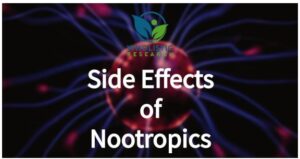
Adverse Side Effects: Some nootropics can cause adverse side effects, such as headaches, insomnia, gastrointestinal distress, or increased anxiety. It is important to carefully monitor your response to nootropics and start with lower dosages to minimize the risk of side effects.
Addiction and Dependence: Certain nootropics, such as Modafinil or Phenibut, can be habit- forming and lead to dependence or withdrawal symptoms. It is important to use nootropics responsibly and avoid using them on a daily basis to reduce the risk of addiction.
Interactions with Medications: Nootropics can interact with other medications, including prescription drugs and supplements, which can cause unintended side effects or reduce the effectiveness of medications. It is important to consult with a healthcare professional before starting any new nootropic regimen if you are taking any medications.
Quality Control and Purity: Because the nootropic industry is not regulated, there is a risk of purchasing contaminated or impure substances that can lead to adverse effects or unexpected interactions. It is important to purchase nootropics from reputable sources and verify the purity and quality of the substances before use.
Lack of Long-Term Research: While some nootropics have been studied extensively, there is a lack of long-term research on the safety and effectiveness of many substances. It is important to weigh the potential benefits and risks of using nootropics and to be cautious with untested or experimental substances.
As a new initiate to nootropics, it is important to start with lower dosages, carefully monitor your response to the substances, and consult with a healthcare professional before starting any new regimen. It is also important to research the substances thoroughly and understand the potential benefits and risks of each nootropic before use. Additionally, it is important to maintain a healthy lifestyle with good nutrition, exercise, and sleep habits, as these can have a significant impact on cognitive function and productivity.

Conclusion:
In conclusion, nootropics can enhance cognitive function and improve performance, but they also carry potential risks and ethical and safety considerations. It is important to research the potential benefits and risks of each nootropic, consult with a healthcare provider, and use them responsibly and ethically. Some nootropics, such as caffeine and omega-3 fatty acids, are natural and safe, while others, such as modafinil and aniracetam, may have more potential risks and side effects. Biohacking can be a powerful tool for self-improvement, but it should be done with caution and informed consent.
 Dr K. Jayanth Murali is a retired IPS officer and a Life Coach. He is the author of four books, including the best-selling 42 Mondays. He is passionate about painting, farming, and long-distance running. He has run several marathons and has two entries in the Asian book of Records in full and half marathon categories. He lives with his family in Chennai, India. When he is not running, he is either writing or chilling with a book.
Dr K. Jayanth Murali is a retired IPS officer and a Life Coach. He is the author of four books, including the best-selling 42 Mondays. He is passionate about painting, farming, and long-distance running. He has run several marathons and has two entries in the Asian book of Records in full and half marathon categories. He lives with his family in Chennai, India. When he is not running, he is either writing or chilling with a book.
